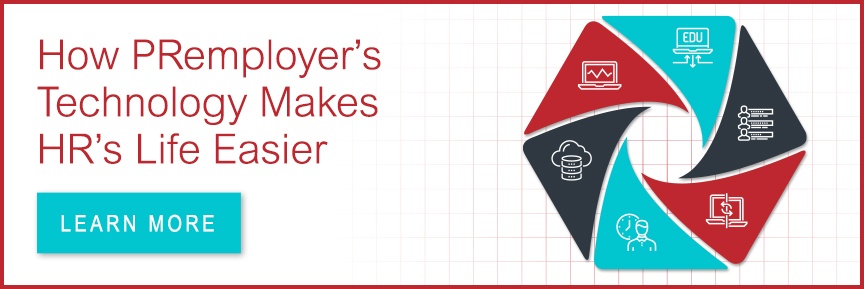
This is part 3 of a 4-part blog post detailing some of the administrative duties of Professional Employer Organizations (PEOs). In part 1, we learned about human resources. In part 2, we discussed the administrative duties related to workers' compensation.
72% of employees admit that better benefits packages would increase their job satisfaction. 58% of employees say that benefits packages are a primary driver in where they choose to work. And over 50% of employees would leave their jobs today for another company that offered similar pay and role but better benefits.
In other words, benefits play a significant role in employee retention, satisfaction, and engagement. But navigating the benefits landscape isn't easy. There are thousands of unique benefits packages on the market, each carrying pros and cons to be assessed and audited for employer fit. For small businesses, accessing crucial benefits can also be incredibly expensive. Since you don't have the economies of scale of large corporations, benefits providers will often charge you more for less comprehensive benefits packages than your larger peers — leaving you vulnerable to talent poaching.
Professional Employer Organizations (PEOs) can help your business find the right benefits packages, and a reputable PEO will bring the employees from all of its clients to the bargaining table with benefits providers. This gives SMBs scale for benefits negotiations, and it provides organizations with an easy way to manage their complex network of benefits packages.
Today, we're going to look at some of the administrative roles PEOs can play for your company when it comes to benefits, and how using a PEO can save you time, money, and headaches during thebenefits administration process.
Renewal Negotiations
Every year, your company is forced to renew negotiations for benefits. During this period, your rates, premiums, copays, and deductibles may change depending on a variety of factors, including claims history, risk factors, and employee headcount. For many employers, this process can be a nightmare. Rates can skyrocket, and deductible changes can cause friction with employees.
Luckily, the renew negotiations don't have to be a time of pain. They can be an incredible opportunity. By partnering with a PEO, you get economies of scale and a wealth of experience to join you at the negotiating table. So, instead of walking away with higher rates, you walk away with Fortune 500-level benefits.
Open Enrollment & Claims Inquiries and Assistance
During open enrollment, employees can make critical changes to their benefits packages. Unfortunately, 73% of employees don't understand their policies, and 2 in 5 of them spend less than 15 minutes during the benefits selection process. For most businesses, finding time to help employers navigate the complex landscape of benefits is difficult. And they need it. Not only do most employees find navigating benefits packages difficult, but 72% admit that understanding and customizing their benefits would boost their loyalty to their employer.
PEOs can help. Not only will PEOs help you administer benefits by weighing in at the negotiating table, but they can help your employees better understand the benefit options available to them. Remember, benefits directly impact employee satisfaction. In fact, 55% of employees would be willing to take a job with a lower salary simply to secure better benefits. Helping them find those benefits is just one way that PEOs can help you keep satisfaction rates sky-high. A knowledgeable, informed, and reputable outsourced HR partner can also help your answer any questions your employees have regarding plans — helping you breed a more informed and holistic HR environment.
Eliminating Premium Leakage
In addition to helping maximize benefits coverage across your employee population, PEOs can sniff out premium leakage that could be costing your business a significant amount of money. Optimizing your plan coverage and maximizing your employees' benefits decision-making process are all valuable, but if you're throwing money away each month due to leakage — you're not fully experiencing the value of great benefits.
Leakage can come from anywhere. You could still be paying for employees who have since left their jobs. Or, you could be paying extra, unnecessary fees without being aware. PEOs can hunt out these cost leakages, patch them up, and help you optimize your overall benefits pipeline.
Section 125, File Form 5500, and ACA Reporting
The ERSA requires employers that have large plans with 100 or more employees. While that may sound simple enough, there's a lot to unpack with this form. You need to know whether to file Section A or C. You have to discover if you need to file an insured plan, wrap plan, or 5500 form. And you need to know when to file a Section 125 Cafeteria plan. In other words, there are hundreds of nuances your business needs to understand in order to properly distribute benefits to your crucial employees.
The IRS also requires employers to furnish statements on employee healthcare plans and coverage for ACA. This includes both Form 1095-B and Form 1095-C — which must be completed by every business with over 50 employees. Again, PEOs can help you file these types of documents and provide critical filing advice to help you stay compliant.
Benefits Reconciliation
Insurance premium reconciliation involves manual pour over to correct underpayments and overpayments to benefits providers. Typically, this is a time-intensive procedure that requires you to look through employee plans and payroll to identify accuracy, areas of leakage, and over-or-under payments.
Often times, employers are rushed to provide adequate benefits. Recent Glassdoor surveys show that 4 out of 5 employees would rather have better benefit opportunities than a pay raise. So, after the dash to secure benefits has ended, many employers call it a wrap and focus on other HR administrative duties — like payroll.
Unfortunately, this often leads to benefit accounting errors. Are you sure that you haven't overpaid for health insurance? Are you accidentally still paying for vision and dental insurance for employers who opted out? Are you still footing the bill for an employer who quit months ago? These tiny payroll mistakes can lead to massive costs for your business.
Fixing these issues requires a significant time investment. PEOs make it easy. Since you PEO handles many of your administrative duties, they will carefully pour over existing benefit packages and payroll to sniff out discrepancies. While this may seem like a value-added benefit of working with a PEO, it can make a massive difference to your end-of-the-year budget.
You may not think you're overpaying. But there's a decent chance you are. Even the federal government deals with overpayment issues, and businesses aren't immune to these simple mistakes that incur monthly costs.
Helping You Secure Value-driven Benefits Packages
Benefits extend far beyond health, vision, and dental. 83% of employers admit that retaining employers is the primary reason they invest in benefits. And that's smart. 50% of your employees would leave their jobs today for a job with better benefits. Studies show that the more benefits you offer, the more likely your employees are to stay with you and engage during work time.
PEOs can help you access value-driven benefits beyond healthcare, dental, and vision — like disability insurance and life insurance. Since PEOs are directly integrated into your HR workflows and administrative framework, they can help you decide on the cost-benefit ratio surrounding securing additional benefits outside of the scope of health, vision, and dental.
On the flip side, PEOs can help your business secure value-added liability packages like employment practices liability insurance to help safeguard you against potential liability threats. Again, this is something that should be handled uniquely for every business, and you should connect with your outsourced HR partner to discuss the pros and cons of each package.
Compliance Administration
HR has a significant compliance burden. Legislation like the Consolidated Omnibus Budget Reconciliation Act (COBRA) requires employers to comply with specific administrative steps, including notifying employees, providing timely notices, and collecting premiums. This is another area where PEOs can save businesses significant time, money, and headaches.
From ERISA to COBRA and beyond, PEOs can help you remain compliant to broad and granular benefit compliance requirements, giving you the freedom to focus on what really matters — growing your business.
Stay Tuned for Part 4
PEOs can help employers and employees digest the incredible complex landscape of benefits. But that's not all. In the next post, we'll cover how PEOs can help you administer employee self-service and onboarding software to reduce stress, improve productivity, and increase overall employee awareness.

